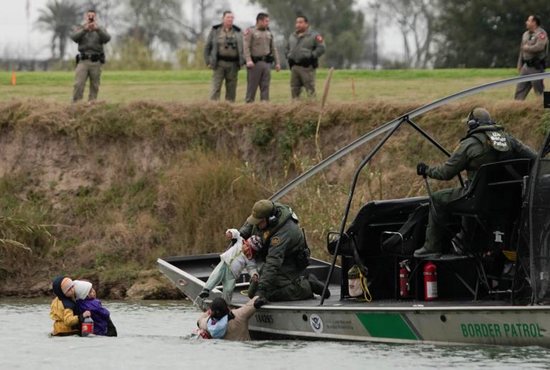
Catholic bishops near the U.S.-Mexico border, joined by other U.S. prelates, voiced opposition just after President Donald Trump’s Feb. 15 declaration of a national emergency so he can order construction of a barrier along parts of the border between the two countries.
“In our view, a border wall is first and foremost a symbol of division and animosity between two friendly countries. Furthermore, the wall would be an ineffective use of resources at a time of financial austerity; it would also would destroy parts of the environment, disrupt the livelihoods of ranchers and farmers, weaken cooperation and commerce between border communities, and, at least in one instance, undermine the right to the freedom of worship,” said the statement released just after President Trump, in a news conference, said he was going to sign a national emergency declaration to stave off a flow of drugs, human trafficking, gang members and illegal immigration coming across the southern border.
Though the president was to sign a spending bill that provides $1.375 billion for fencing and other measures along the border — a fraction of the $5.7 billion he had been asking from Congress for construction of the structure — he announced the national emergency that could grant him up to $8 billion for his project.
The promise of a wall on the southern border was key to his presidential campaign, but as candidate he said Mexico, not the U.S., would pay for the structure. When Mexico refused to pay for the wall, he turned to U.S. lawmakers for funding, but they have largely refused to grant U.S. taxpayer money to build it, which led to a partial government shutdown earlier this year.
In the statement, the bishops said that while they agree with the president that there is a “humanitarian challenge” at the border, “erecting a wall will not solve the problem,” they said, and they asked Congress to step in with more humanitarian responses.
The statement was signed by Bishop Robert W. McElroy of San Diego; Texas Bishops Mark P. Seitz of El Paso, James A. Tamayo of Laredo and Archbishop Gustavo Garcia-Siller of San Antonio; Bishop Edward J. Weisenburger of Tucson, Arizona; Cardinal Joseph W. Tobin of Newark, New Jersey; New Mexico Archbishop John C. Wester of Santa Fe; retired Bishop Ricardo Ramirez of Las Cruces; retired Tucson Bishop Gerald F. Kicanas, who is apostolic administrator of Las Cruces; and Bishop John Stowe of Lexington, Kentucky.
In his speech, the president said he wanted to build the wall, “not just because it was a campaign promise,” but because “everyone knows a wall works” and the national emergency he was calling for had been used by presidents previously without problems. Such declarations are common and at least 31 declared emergencies remain in place, but the current one seems to be designed to get around Congress.
The bishops in their statement said they worried that a wall would drive migrants to more remote regions of the border and risk great loss of life. When a wall was constructed in the San Diego area in the mid-1990s, for example, migrants were driven, often by smugglers, to the desert of Arizona and other remote regions in order to cross the border, their statement said, citing U.S. Border Patrol statistics that showed that over 7,000 migrants died in those areas from 1998 to 2016.
“The truth is that the majority of persons coming to the U.S./Mexico border are asylum-seekers, many of whom are women and children from Guatemala, Honduras and El Salvador who are fleeing persecution and violence in their home countries,” the bishops’ statement says. “Along their journey to safety, they encounter many dangers. A wall would not keep them safe from those dangers. Rather, a wall would, further subject them to harm by drug cartels, smugglers, and human traffickers.”
They said that while the country had a right to control and secure its borders, “border enforcement must protect and preserve the human rights and life of all persons, regardless of their legal status.” Instead of a wall, they said, Congress should focus on more humane policies, such as reforming the immigration system “in a manner that is just, protects human rights and reflects American values.”
Trump said he expected lawsuits over the national security declaration but hoped the Supreme Court of the United States would ultimately rule in his favor.
Other Catholic groups such as the Sisters of Mercy and the Columban Center for Advocacy and Outreach also voiced early opposition to the declaration.
“We unequivocally oppose the president’s decision to declare a state of national emergency in order to circumvent Congress and divert funding to pay for construction of a border wall. This decision is immoral and unnecessary. The real emergency is the dehumanization of migrants and the utter disregard for border communities and the environment. Construction of a wall and further militarization is not a solution,” said a statement from the Columban Center for Advocacy and Outreach.
“A declaration of a national emergency aimed at funding an immoral wall will not correct years of failed immigration policy or ameliorate the U.S. role in root causes of migration,” said Mercy Sister Patricia McDermott, president of the Sisters of Mercy of the Americas in a statement. “The real one is of disinformation and misplaced values. President Trump fans a fear of asylum seekers by mischaracterizing them as criminals when the vast majority are people fleeing unspeakable atrocities for safety and a better life.”



